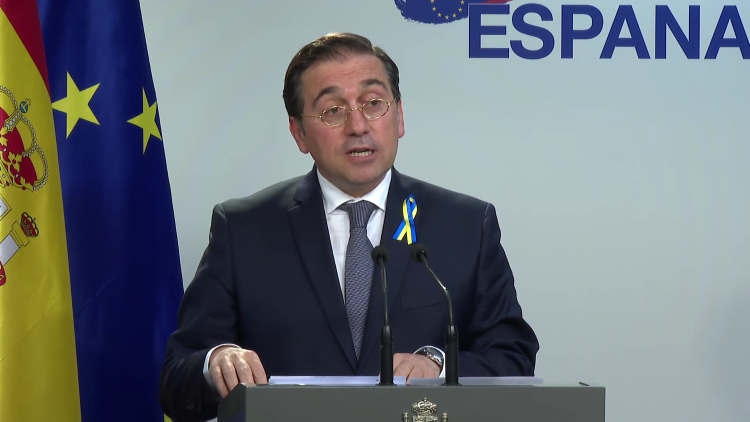Eduardo González
The Minister of Foreign Affairs, José Manuel Albares, participates today in a new meeting with his EU counterparts, in which the situation in the Middle East will be addressed, among other issues, just one day before the Council of Ministers approves the recognition of the Palestinian State by Spain.
The session of the Foreign Affairs Council (FAC) will last two days and will be chaired by the EU High Representative for Foreign Affairs and Security Policy, Josep Borrell. The first day will be attended by the Ministers of Foreign Affairs, including Albares, while the second day will bring together the Ministers of Defense, including the Spanish Margarita Robles.
The meeting will open with a debate on Russia’s aggression against Ukraine, following an exchange of views with Ukrainian Foreign Minister Dmytro Kuleba, who is expected to attend via video conference to give an update on the latest developments on the ground. and Ukraine’s current priorities.
In particular, ministers will take stock of deliveries of military equipment – especially air defense and ammunition – resulting from initiatives by Member States, the European Peace Fund and progress towards the EU’s security commitments agreement with Ukraine . The Council is also expected to address the use of windfall profits derived from frozen Russian assets. Other issues likely to be raised include preparations for the Peace Summit hosted by Switzerland on June 15-16 and the possibility of a new sanctions regime on Russia.
Precisely, tomorrow’s Tuesday meeting, dedicated to Defense, will also begin with Ukraine. In this case, EU Defense Ministers will have the opportunity to have an informal exchange with NATO Secretary General Jens Stoltenberg and Ukrainian Defense Minister Rustema Umerov, who will provide an update on the latest developments. and the most pressing needs of the country.
Venezuela
The second item on the agenda will address the latest events in Venezuela, with special emphasis on the electoral process that will lead to presidential elections on July 28, 2024, and the latest events in Georgia. The High Representative is expected to brief ministers on the latest developments in Venezuela, focusing on the electoral process, the possible dispatch of an EU electoral observation mission and the recent easing of EU sanctions, including the reduction of the extension of the sanctions regime until January 10, 2025.
In November 2023, the EU Foreign Affairs Council renewed sanctions against Venezuela for a period of six months, instead of one year, after Spain recommended the review of these measures in response to the Barbados Agreement between the Government of Nicolás Maduro and the Democratic Unitary Platform for the holding of presidential elections in the second half of 2024 and with the presence of international observers.
In January, the European Union was “very concerned” about the Supreme Court’s decision to ratify the disqualification of opposition presidential candidate María Corina Machado. Albares himself declared before Congress that the decision of the Supreme Court of Justice of Venezuela “does not broaden pluralism and is not in line with what Spain would like to see.”
Middle East
EU foreign ministers will then discuss the situation in the Middle East and have an informal exchange with the foreign ministers of Saudi Arabia, Jordan, Egypt, the United Arab Emirates and Qatar, as well as the Secretary General. of the League of Arab States.
The debate will focus on cooperation between the EU and the Arab world in response to the crisis, on improving the humanitarian situation in Gaza and on reviving the political process “towards a two-state solution”, according to the Council. “The European Union remains firmly committed to a lasting and sustainable peace based on the two-state solution,” it added.
The debate will take place precisely on the eve of the recognition of the Palestinian State by Spain, Ireland and Norway (a country that does not belong to the EU but maintains strong ties of association with the Union), as announced last Wednesday by the president of the Government, Pedro Sánchez, before the plenary session of the Congress of Deputies.
This announcement did not sit well with the Israeli Government of Benjamin Netanyahu, which that same day called its ambassadors in the three countries for consultations and summoned, the following day, the ambassadors of Spain, Ireland and Norway in Tel Aviv to warn them. that the recognition of the State of Palestine by their respective Governments will have “serious” consequences on bilateral relations.
Precisely, Ireland and Norway were where Pedro Sánchez’s round of contacts concluded in the first half of April to obtain the support of other European leaders for the recognition of the Palestinian State. In that mini-tour of the two countries, the head of the Executive obtained the support of the Prime Minister of Norway, Jonas Gahr Støre, and confirmed that of the new Prime Minister of Ireland, Simon Harris, along the same lines as his predecessor, Leo Varadkar.







